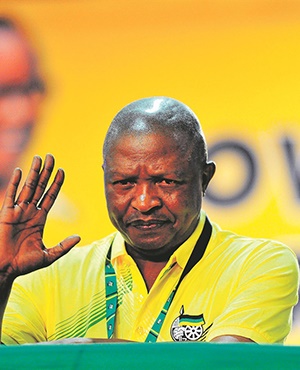Political killings continue to haunt deputy president David Mabuza, whether he answers questions in the National Assembly (NA) or in the National Council of Provinces (NCOP).
On Wednesday afternoon, for the first time since he was appointed deputy president, Mabuza answered questions in the NCOP.
Last week, he appeared in the NA for his first question session and he shot a chilling stare at DA chief whip John Steenhuisen, when Steenhuisen asked about political killings in Mpumalanga.
READ: Mabuza asked about Mpumalanga political killings
On Wednesday, EFF MP Tebogo Mokwele was on the wrong end of a similar stare when she asked, as a supplementary question to a question about corruption, whether he would take it upon himself to ensure that the cases of people killed in connection with corruption, including a speaker from Mbombela, would be reopened.
Before moving to the Union Buildings, Mabuza was the premier of Mpumalanga.
Former speaker of Mbombela, Jimmy Mohlala, was killed in 2009 after he blew the whistle on massive tender corruption surrounding a stadium built for the 2010 FIFA World Cup.
Mabuza said it was "security structures'" role to detect crimes and that he could not interfere in the judiciary's work at any stage.
"As deputy president, I can't tell the National Director of Public Prosecutions what to do," he said. "That will be seen as interference."
Extradition of wanted persons
He said his duty would be to lay a charge with the police if he knew of crimes.
"In terms of my role as deputy president, I'm not assigned the role of policeman. That is why you have policemen and policewomen," he said while Mokwele and her colleague in red, Nkagisang Mokgosi, heckled him.
DA MP Jacques Julius said: "All you say is you're not a policeman."
"I don't think that is a responsible answer."
The first two questions dealt with corruption at state-owned entities and Mabuza tried to convince the members that the government took it seriously and was taking steps to bring to justice those implicated.
"We must fight corruption at our state-owned entities from all angles," he said.
"Corruption is a cancer we must not allow to grow."
He referred to the work of the National Assembly's Portfolio Committee on Public Enterprises' inquiry into state capture and the pending judicial commission of inquiry into state capture.
"We hope beyond that our law enforcement agencies will take over and do what is right," he said.
"If anyone has done wrong on our shores, our laws empower us to find someone to come and account," he added.
"I don't think people can run to other countries," he said, adding that South Africa had international agreements in place for the extradition of wanted persons.
